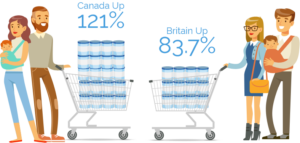How is coronavirus impacting the infant formula market?
As coronavirus swept countries across the world in the early months of 2020, it brought dramatic change to consumers’ shopping habits. Many have cut back on non-essential items and increased spending on groceries and household supplies, building up their stockpiles of essential goods.
For any parent unable to breastfeed their baby, nothing is more essential than infant formula, and the increase in demand has been dramatic in several countries.
In Canada, formula sales were up 121% in mid-March compared to a year earlier, while Britain saw an increase of 83.7% for the same time period. In both countries – as well as the United States and Australia – news reports have highlighted parents’ struggles to purchase the formula they need following weeks of widespread panic-buying.
In the U.S., manufacturers have now ramped up production, which is expected to ease pressure on supplies, but it could be several months before panic-buying ends. “Parents will be able to find what they are looking for, but they are not going to see those copious amounts of formula on store shelves that they may have been accustomed to seeing,” Mintel analyst Billy Roberts told USA Today in mid-April.

China has been able to keep its supermarket shelves stocked with infant formula more effectively. Nonetheless, it has been predicted that consumers may start to rely more on formula from domestic manufacturers, with imported formula facing rising air-freight costs and longer transit times.
Supply-chain disruption is another concern. Factories involved with the production of essential goods – including infant formula – have largely continued to operate as normal. However, many manufacturers rely on ingredients produced in other countries, which creates added uncertainty. To limit the potential for future disruption, a number of Chinese manufacturers that make use of imported milk powder additives have stockpiled for several months.
As the industry adjusts to COVID-19, its impact on consumers’ infant formula purchasing habits remains to be seen. McKinsey research on general consumer behavior has found that shoppers are trying new brands when the ones they are used to are unavailable. Many shoppers also expect to spend less as a result of coronavirus.
With a significant number of consumers now focusing their spending on essential supplies, demand for high-quality infant formula may well prove resilient.
Factors affecting the infant formula market in China

